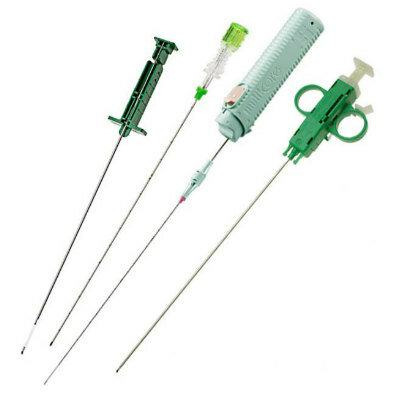American College of Radiology Releases Initial Use Cases in AI Library
|
By HospiMedica International staff writers Posted on 03 Sep 2018 |

Image: The American College of Radiology Data Science Institute has started releasing its first AI use cases in the ACR DSI TOUCH-AI library for generating feedback (Photo courtesy of the ACR).
The American College of Radiology Data Science Institute {(ACR DSI) Reston, VA, USA} has started releasing its first artificial intelligence (AI) use cases in the ACR DSI TOUCH-AI library for generating feedback ahead of the projected release of all of the use cases in the fall.
The ACR DSI had launched medical imaging AI use case development in May 2017 to develop and use AI to assist radiologists in improving medical imaging care. According to ACR DSI, individual entities developing AI can find it difficult to solve healthcare problems in a comprehensive way that provides value to the clinical setting. After its release, the freely available use cases in the ACR DSI TOUCH-AI library will make the areas in which AI can improve patient care quite clear for vendors, clinicians and patients.
Apart from medical specialty societies and standards organizations, the ACR DSI has asked for feedback on the use cases from various AI, analytics, reporting systems, EMRs, and PACS organizations. It is also open to all organizations that are currently developing or supporting AI applications in radiology.
“As we are working to obtain and incorporate feedback into our preliminary use cases, we are seeing a groundswell of support for the information we are providing,” said Laura Coombs, ACR senior director of informatics. “This is an exciting stage of use case development because every bit of feedback, no matter how small, has the potential to profoundly affect both the industry and clinicians’ ability to create and deploy AI technology.”
Related Links:
American College of Radiology Data Science Institute
The ACR DSI had launched medical imaging AI use case development in May 2017 to develop and use AI to assist radiologists in improving medical imaging care. According to ACR DSI, individual entities developing AI can find it difficult to solve healthcare problems in a comprehensive way that provides value to the clinical setting. After its release, the freely available use cases in the ACR DSI TOUCH-AI library will make the areas in which AI can improve patient care quite clear for vendors, clinicians and patients.
Apart from medical specialty societies and standards organizations, the ACR DSI has asked for feedback on the use cases from various AI, analytics, reporting systems, EMRs, and PACS organizations. It is also open to all organizations that are currently developing or supporting AI applications in radiology.
“As we are working to obtain and incorporate feedback into our preliminary use cases, we are seeing a groundswell of support for the information we are providing,” said Laura Coombs, ACR senior director of informatics. “This is an exciting stage of use case development because every bit of feedback, no matter how small, has the potential to profoundly affect both the industry and clinicians’ ability to create and deploy AI technology.”
Related Links:
American College of Radiology Data Science Institute
Channels
Artificial Intelligence
view channel
AI-Powered Algorithm to Revolutionize Detection of Atrial Fibrillation
Atrial fibrillation (AFib), a condition characterized by an irregular and often rapid heart rate, is linked to increased risks of stroke and heart failure. This is because the irregular heartbeat in AFib... Read more
AI Diagnostic Tool Accurately Detects Valvular Disorders Often Missed by Doctors
Doctors generally use stethoscopes to listen for the characteristic lub-dub sounds made by heart valves opening and closing. They also listen for less prominent sounds that indicate problems with these valves.... Read moreCritical Care
view channel
Powerful AI Risk Assessment Tool Predicts Outcomes in Heart Failure Patients
Heart failure is a serious condition where the heart cannot pump sufficient blood to meet the body's needs, leading to symptoms like fatigue, weakness, and swelling in the legs and feet, and it can ultimately... Read more
Peptide-Based Hydrogels Repair Damaged Organs and Tissues On-The-Spot
Scientists have ingeniously combined biomedical expertise with nature-inspired engineering to develop a jelly-like material that holds significant promise for immediate repairs to a wide variety of damaged... Read more
One-Hour Endoscopic Procedure Could Eliminate Need for Insulin for Type 2 Diabetes
Over 37 million Americans are diagnosed with diabetes, and more than 90% of these cases are Type 2 diabetes. This form of diabetes is most commonly seen in individuals over 45, though an increasing number... Read moreSurgical Techniques
view channel
Miniaturized Ultrasonic Scalpel Enables Faster and Safer Robotic-Assisted Surgery
Robot-assisted surgery (RAS) has gained significant popularity in recent years and is now extensively used across various surgical fields such as urology, gynecology, and cardiology. These surgeries, performed... Read moreAI Assisted Reading Tool for Small Bowel Video Capsule Endoscopy Detects More Lesions
A revolutionary artificial intelligence (AI) technology that has proven faster and more accurate in diagnosing small bowel bleeding could transform gastrointestinal medicine. AnX Robotica (Plano, TX,... Read more
First-Ever Contact Force Pulsed Field Ablation System to Transform Treatment of Ventricular Arrhythmias
It is estimated that over 6 million patients in the US and Europe are affected by ventricular arrhythmias, which include conditions such as ventricular tachycardia (VT) and premature ventricular contractions (PVCs).... Read more
Caterpillar Robot with Built-In Steering System Crawls Easily Through Loops and Bends
Soft robots often face challenges in being guided effectively because adding steering mechanisms typically reduces their flexibility by increasing rigidity. Now, a team of engineers has combined ancient... Read morePatient Care
view channelFirst-Of-Its-Kind Portable Germicidal Light Technology Disinfects High-Touch Clinical Surfaces in Seconds
Reducing healthcare-acquired infections (HAIs) remains a pressing issue within global healthcare systems. In the United States alone, 1.7 million patients contract HAIs annually, leading to approximately... Read more
Surgical Capacity Optimization Solution Helps Hospitals Boost OR Utilization
An innovative solution has the capability to transform surgical capacity utilization by targeting the root cause of surgical block time inefficiencies. Fujitsu Limited’s (Tokyo, Japan) Surgical Capacity... Read more
Game-Changing Innovation in Surgical Instrument Sterilization Significantly Improves OR Throughput
A groundbreaking innovation enables hospitals to significantly improve instrument processing time and throughput in operating rooms (ORs) and sterile processing departments. Turbett Surgical, Inc.... Read moreHealth IT
view channel
Machine Learning Model Improves Mortality Risk Prediction for Cardiac Surgery Patients
Machine learning algorithms have been deployed to create predictive models in various medical fields, with some demonstrating improved outcomes compared to their standard-of-care counterparts.... Read more
Strategic Collaboration to Develop and Integrate Generative AI into Healthcare
Top industry experts have underscored the immediate requirement for healthcare systems and hospitals to respond to severe cost and margin pressures. Close to half of U.S. hospitals ended 2022 in the red... Read more
AI-Enabled Operating Rooms Solution Helps Hospitals Maximize Utilization and Unlock Capacity
For healthcare organizations, optimizing operating room (OR) utilization during prime time hours is a complex challenge. Surgeons and clinics face difficulties in finding available slots for booking cases,... Read more
AI Predicts Pancreatic Cancer Three Years before Diagnosis from Patients’ Medical Records
Screening for common cancers like breast, cervix, and prostate cancer relies on relatively simple and highly effective techniques, such as mammograms, Pap smears, and blood tests. These methods have revolutionized... Read morePoint of Care
view channel
Critical Bleeding Management System to Help Hospitals Further Standardize Viscoelastic Testing
Surgical procedures are often accompanied by significant blood loss and the subsequent high likelihood of the need for allogeneic blood transfusions. These transfusions, while critical, are linked to various... Read more
Point of Care HIV Test Enables Early Infection Diagnosis for Infants
Early diagnosis and initiation of treatment are crucial for the survival of infants infected with HIV (human immunodeficiency virus). Without treatment, approximately 50% of infants who acquire HIV during... Read more
Whole Blood Rapid Test Aids Assessment of Concussion at Patient's Bedside
In the United States annually, approximately five million individuals seek emergency department care for traumatic brain injuries (TBIs), yet over half of those suspecting a concussion may never get it checked.... Read more
New Generation Glucose Hospital Meter System Ensures Accurate, Interference-Free and Safe Use
A new generation glucose hospital meter system now comes with several features that make hospital glucose testing easier and more secure while continuing to offer accuracy, freedom from interference, and... Read moreBusiness
view channel
Johnson & Johnson Acquires Cardiovascular Medical Device Company Shockwave Medical
Johnson & Johnson (New Brunswick, N.J., USA) and Shockwave Medical (Santa Clara, CA, USA) have entered into a definitive agreement under which Johnson & Johnson will acquire all of Shockwave’s... Read more














